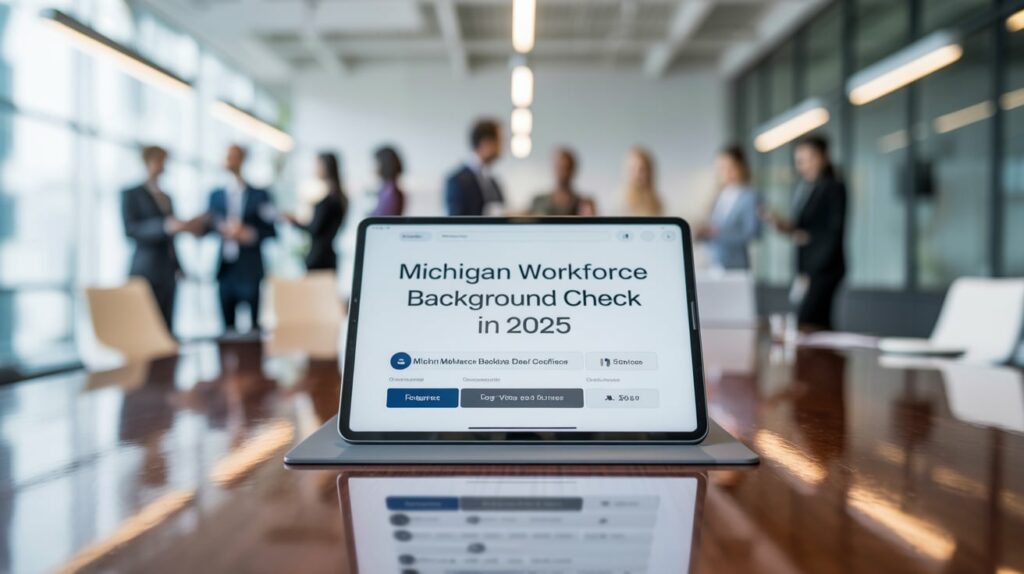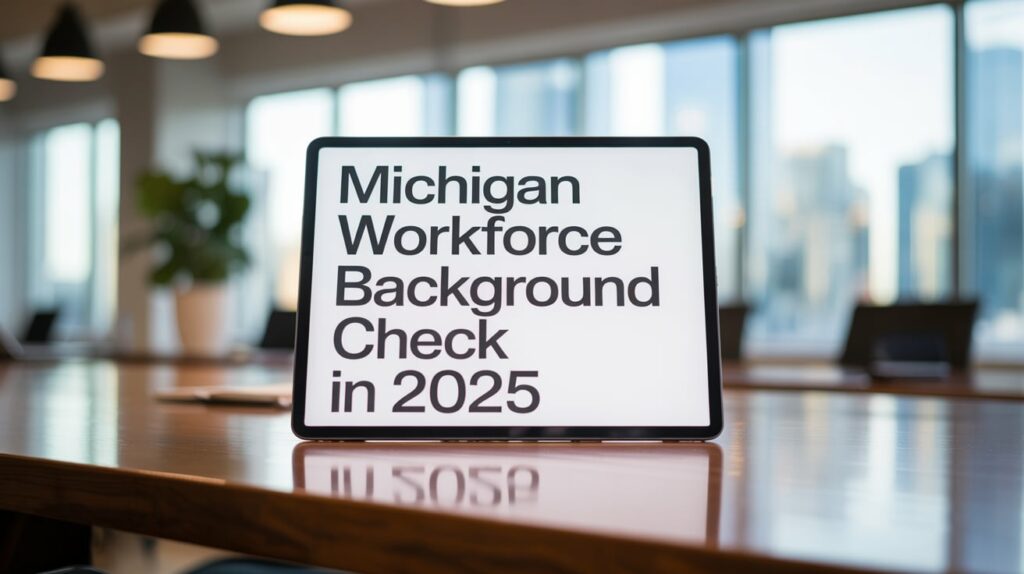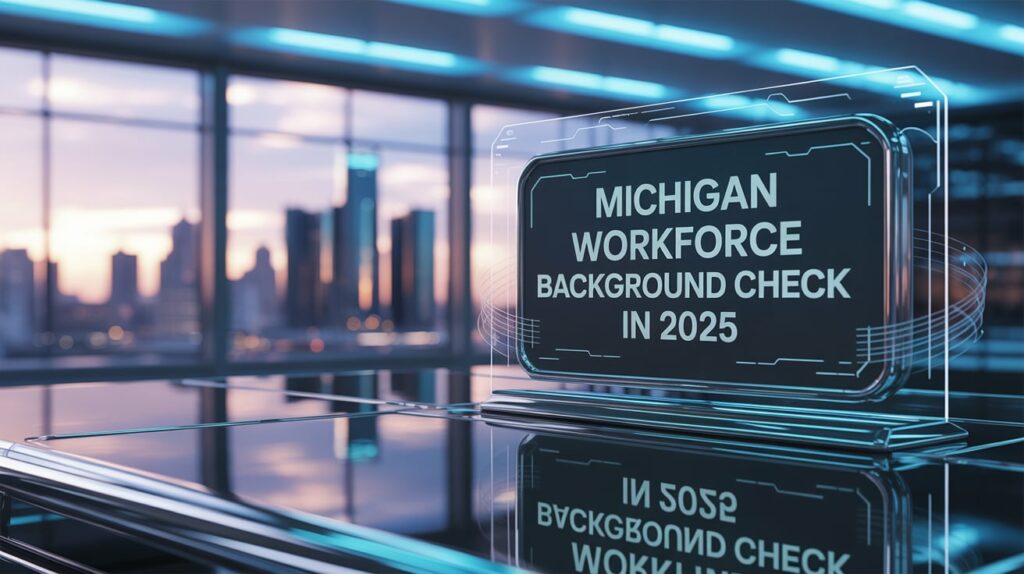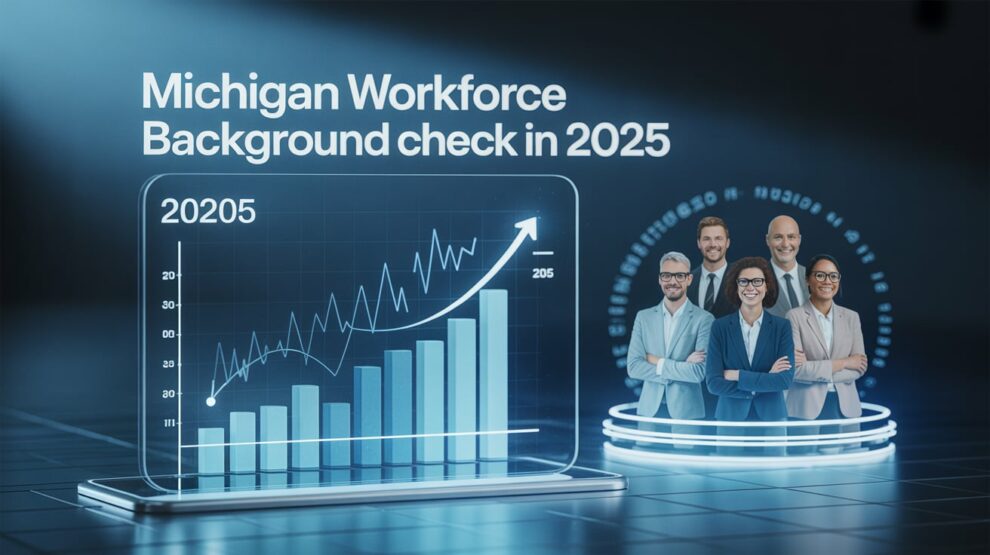Hiring in Michigan? One overlooked mistake in your Michigan Workforce Background Check process could cost you more than just a great employee—it could cost you your business.
Table of Contents
The Michigan workforce background check is a critical step for employers seeking to hire trustworthy, qualified, and compliant employees. Whether you’re in healthcare, education, finance, transportation, or any other industry, understanding how Michigan regulates background screening can help ensure both legal compliance and a safer workplace. In an era where due diligence is more important than ever, businesses must navigate federal and state-specific regulations when conducting pre-employment checks.
This guide provides an in-depth overview of how Michigan handles background checks for workforce purposes, the types of checks required or permitted, legal limitations, industry-specific mandates, and best practices for implementation. Whether you’re an HR professional, business owner, or job applicant, this article will help you understand the full scope of the Michigan workforce background check process.
What Is a Michigan Workforce Background Check?
A Michigan workforce background check involves reviewing an individual’s criminal history, employment record, education verification, professional licenses, and other relevant information prior to or during employment. Michigan employers often perform these checks to:
- Confirm candidate qualifications
- Mitigate liability risks
- Maintain workplace safety
- Comply with state and federal laws
These checks can include:
- Criminal background checks
- Fingerprint-based checks
- Driving record checks
- Drug screenings
- Credit history (when applicable)
- Sex offender registry checks
- Employment and education verification
Legal Framework for Background Checks in Michigan
Michigan’s Criminal Background Check Laws
Michigan follows federal guidelines under the Fair Credit Reporting Act (FCRA) while also maintaining specific state regulations. Key legal considerations include:
- Ban-the-Box Law: Michigan’s Executive Directive 2018-4 prohibits state departments from asking about criminal history on job applications. However, private employers are not required to follow this rule.
- Use of Arrest Records: Employers in Michigan are discouraged from using non-conviction arrest records to make employment decisions.
- Fair Hiring Practices: Employers must avoid policies that disproportionately affect protected classes under the Elliott-Larsen Civil Rights Act.
Fingerprint-Based Background Checks in Michigan

Certain industries in Michigan, such as healthcare, childcare, and education, require Live Scan fingerprinting for background checks. This method captures biometric data and submits it to the Michigan State Police (MSP) and the Federal Bureau of Investigation (FBI) for a comprehensive criminal history review.
Industries that often require fingerprint-based background checks include:
- Public and private schools
- Healthcare facilities and long-term care employers
- Law enforcement agencies
- Financial services institutions
- Childcare and adult care providers
Michigan Workforce Background Check Process: Step-by-Step
1. Determine Legal Requirements
Before conducting any Michigan workforce background check, employers must identify the applicable legal requirements for their specific industry. These can vary significantly depending on the nature of the business, the level of responsibility associated with the role, and whether state or federal oversight is involved.
- Statutory Mandates: Michigan statutes outline mandatory background check requirements for certain job categories—especially in fields involving vulnerable populations, such as children, the elderly, or individuals with disabilities. For instance, employees in long-term care facilities must undergo fingerprint-based background checks under Michigan’s Public Health Code.
- Licensing Authority Rules: Many professional licensing boards in Michigan—such as those governing nursing, teaching, or financial services—require background checks as a condition of licensing or certification. These checks must often be completed both at the time of application and periodically thereafter.
- Federal Regulations (e.g., DOT or FDIC): Employers subject to federal regulation, like transportation companies governed by the Department of Transportation (DOT) or financial institutions regulated by the Federal Deposit Insurance Corporation (FDIC), must also adhere to federal standards. These typically include additional screenings such as drug testing, credit history reviews, or detailed employment history verifications.
Understanding these legal frameworks ensures that employers remain compliant and avoid penalties or civil liabilities for negligent hiring.
2. Obtain Written Consent
As required by the Fair Credit Reporting Act (FCRA), employers must receive explicit, written consent from the job applicant or employee before conducting any background check. This requirement is non-negotiable and applies to all pre-employment and periodic screenings.
- The consent form must be separate from the job application and written in clear and understandable language.
- If the employer plans to conduct additional checks after hiring (e.g., periodic criminal record reviews), they must disclose this in advance and secure ongoing authorization.
Failure to obtain written consent is a violation of the FCRA and can result in lawsuits, fines, and reputational damage.
3. Select a Reputable Background Check Provider
Employers should partner with a Consumer Reporting Agency (CRA) that is FCRA-compliant and familiar with Michigan-specific background check regulations. An experienced CRA will help ensure that reports are accurate, comprehensive, and legally obtained.
- Look for CRAs that offer customizable background check packages tailored to your industry needs.
- Verify that the agency updates records regularly and uses verified data sources like state court systems and law enforcement databases.
- Ensure the CRA provides pre-adverse and adverse action notifications as required by the FCRA.
Choosing a trusted provider can minimize the risk of hiring errors, legal liability, and discrimination claims.
4. Conduct the Background Check
Once consent is obtained and a provider is chosen, the background check process begins. Employers in Michigan typically include the following elements in their checks:
- Michigan ICHAT Search: The Internet Criminal History Access Tool (ICHAT) provides name-based access to the criminal records database maintained by the Michigan State Police. It covers all felony and misdemeanor convictions recorded in Michigan but does not include federal crimes, out-of-state offenses, or sealed records.
- Driving Record (Secretary of State): For positions requiring driving (e.g., delivery drivers, transportation workers), a driving record check through the Michigan Secretary of State is essential. This report may include traffic violations, DUI convictions, license suspensions, and other relevant driving history.
- Drug Testing: Many employers—especially in regulated industries—conduct pre-employment and ongoing drug testing. These screenings typically test for controlled substances and are conducted via certified labs to ensure accuracy.
- Education and Employment Verification: Confirming a candidate’s academic credentials and work history is crucial to verify honesty and qualification. This may include checking diplomas, degrees, certifications, previous job titles, duties, and length of employment.
Together, these components create a comprehensive picture of the applicant’s background and help employers make informed decisions.
5. Review the Results
Once the results are in, employers must analyze the information responsibly and legally. Michigan law emphasizes individualized assessments when interpreting background check findings.
Key considerations include:
- Nature of the Offense: Employers must determine whether the criminal offense relates directly to the job duties. For example, a conviction for theft may be disqualifying for a financial position but less relevant for a warehouse role.
- Time Elapsed Since Conviction: Older convictions, especially those over seven years old or those where the individual has shown rehabilitation, may carry less weight than recent offenses.
- Relevance to the Job Role: Evaluate whether the background findings indicate a direct risk to clients, customers, or other employees, or if the conviction is irrelevant to job performance.
Employers must avoid blanket disqualification policies, as these can lead to claims of discrimination under both Michigan law and federal Equal Employment Opportunity Commission (EEOC) guidelines.
6. Take Action According to Legal Guidelines
If an employer decides not to hire or retain an individual based on the background check, they must follow the FCRA’s adverse action procedures, which include:
- Pre-Adverse Action Notice: Inform the applicant that you are considering adverse action based on the background report. Include a copy of the report and a “Summary of Rights under the FCRA.”
- Waiting Period: Allow the applicant a reasonable period (usually five business days) to dispute or clarify the information.
- Final Adverse Action Notice: If the decision stands, send a final notice indicating the denial of employment. This notice must include the CRA’s contact information and reiterate the applicant’s rights.
Following these steps helps employers stay compliant and provides applicants with the opportunity to correct any inaccuracies in their report.
Industry-Specific Background Check Requirements in Michigan

Healthcare
Michigan healthcare employers, including hospitals, nursing homes, and long-term care facilities, are required by law to conduct fingerprint-based background checks. Under the Michigan Public Health Code, individuals with certain convictions (such as abuse, neglect, or controlled substance violations) may be barred from employment in patient-care roles.
Employers in this sector must also comply with Medicare and Medicaid program integrity rules, which prohibit the hiring of individuals excluded from federal healthcare programs.
Education
All public and private K–12 schools in Michigan must perform comprehensive background checks, including fingerprinting, for every employee, volunteer, and contractor who may have unsupervised access to children. This includes:
- Teachers and substitute teachers
- Administrative staff
- Custodians and maintenance workers
- School bus drivers and aides
The fingerprint data is submitted to the Michigan State Police and FBI, ensuring national-level criminal history reviews. Any disqualifying convictions—especially those related to violence, sex offenses, or child endangerment—can result in an automatic bar from employment.
Transportation
Employers in the transportation sector must adhere to stringent federal safety regulations set forth by the Department of Transportation (DOT). These include:
- Drug and Alcohol Testing: Mandatory pre-employment, random, post-accident, and return-to-duty testing. Employers must maintain a drug testing program that meets DOT standards.
- Motor Vehicle Record (MVR) Reviews: Employers must review an applicant’s driving record to ensure compliance with safety and licensing standards.
- Safety Performance History Investigations: Employers must contact previous DOT-regulated employers to obtain safety-related information, including records of accidents and substance abuse violations.
These requirements help ensure that individuals entrusted with transporting goods or passengers are safe, responsible, and drug-free.
Michigan ICHAT Background Check System

The Internet Criminal History Access Tool (ICHAT) is a publicly accessible system operated by the Michigan State Police. It allows individuals and employers to search for state-level criminal convictions based on the subject’s full name and date of birth.
Key Features of ICHAT:
- Name-Based Search: Unlike fingerprint checks, ICHAT uses the person’s full name and date of birth. While quick and convenient, this method may result in false positives or incomplete data if names are common or misspelled.
- Felony and Misdemeanor Convictions: ICHAT provides information on both felony and misdemeanor convictions that occurred in Michigan. It does not include pending charges or cases adjudicated in other states.
- Excludes Juvenile and Non-Criminal History: The ICHAT database does not include juvenile records, civil infractions (like parking tickets), or sealed/expunged records.
Important Limitations:
- Not a Substitute for Fingerprint Checks: While ICHAT is useful for preliminary screening, it does not offer the depth or accuracy of fingerprint-based background checks, which are required for regulated industries like healthcare and education.
- Not Comprehensive: ICHAT only searches Michigan’s criminal record database. It does not include federal offenses or crimes committed in other states. For a full nationwide screening, employers should use a CRA offering multi-jurisdictional criminal record searches.
Limitations of Michigan Workforce Background Checks
- Time constraints: Some background checks may take days or weeks to complete, especially fingerprint-based ones.
- Data accuracy: Errors in public databases can lead to incorrect conclusions.
- Privacy concerns: Employers must manage applicant data securely and comply with privacy laws.
- Disparate impact: Improperly used checks can unintentionally discriminate against protected groups.
Frequently Asked Questions (FAQs)
What is included in a Michigan workforce background check?
It typically includes criminal history, employment verification, educational credentials, driving records, and sometimes credit checks or drug screening, depending on the role.
Is consent required for a background check in Michigan?
Yes. Employers must get written authorization from the individual before initiating a background check.
How far back do background checks go in Michigan?
There’s no specific state limit. However, the FCRA recommends a seven-year lookback for non-conviction information. Felony convictions may appear indefinitely unless expunged.
Can I be denied a job for a misdemeanor in Michigan?
Yes, but only if the misdemeanor is relevant to the job. Employers must evaluate each case individually to avoid discrimination.
Are fingerprint background checks mandatory in Michigan?
Yes, for jobs in regulated sectors like healthcare, education, and law enforcement. These checks provide more accurate and comprehensive data than name-based checks.
What is the ICHAT system used for?
The ICHAT system is used to access public criminal records held by the Michigan State Police and is commonly used by employers for basic screening.
Conclusion
A Michigan workforce background check is a vital component of the hiring process for employers across various industries. By ensuring compliance with both federal and state laws, businesses can protect their operations, safeguard their reputations, and hire with confidence. From understanding ICHAT reports to fulfilling fingerprinting requirements in healthcare and education, Michigan employers must follow specific procedures to maintain legal and ethical standards.
Whether you’re a business seeking to implement a background check policy or an applicant trying to understand what employers might uncover, staying informed is essential. With proper planning, consent procedures, and legal awareness, workforce background checks can become a powerful tool for building a trustworthy team in the state of Michigan.
Do Follow Dragcast on Social Media For More Such Content.












Add Comment